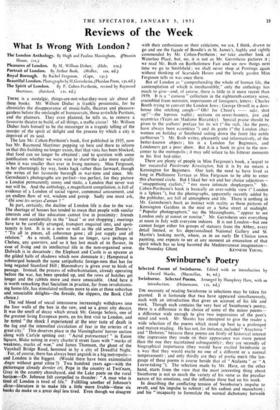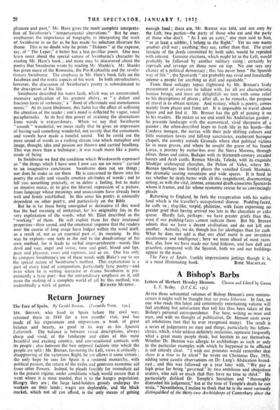Swinburne's Poetry
Selected Poems of Swinburne. Edited with an introduction by Edward Shanks. (Macmillan. Is. 6d.) Swinburne. Selected Poems. Arranged by Humphrey Hare, with an introduction. (Heinemann. :2s. 6d.) THE necessity of reading Swinburne in selections may be taken for granted. It is fortunate that two have appeared simultaneously, each with an introduction that gives an account of his life and work. Though each contains the very best of Swinburne's poetry, there is a difference in the choice of some of the minor poems— a difference wide enough to give two impressions of the poet's mind and work. Mr. Shanks has attempted to give the reader a wide selection of the poems which stand up best to a prolonged and mature reading. He has not, for instance, included " Anacioria " and " Dolores," because these poems are firstly of historical interest (the impression they made on their appearance was more potent than the one they maintained subsequently); they are secondly of biographical importance (they would have excited Swinburne in a way that they would excite no one of a different or a normal temperament) ; and only thirdly are they of poetic merit (the lan- guage of these poems is coarse beside that of " Atalanta " or " A Leave-taking "). The selection made by Mr. Hare, on the other hand, starts from the view that the most interesting thing about Swinburne is not so much the variety of his verse as the peculiar nature of his emotions, and the influence these had on his work.
In describing the conflicting tension of Swinburne's impulse to revolt. and his impulse to submit ; of his sadism and masochism,; and his " incapacity to formulate the normal dichotomy between pleasure and pain," Mr. Hare gives the mofe- complete interpreta- tion of Swinburne's " temperamental aberrations." But he over- emphasises the importance of biography in interpreting the work of Swinburne in so far as he has made his selection illustrate his theme. This is no doubt why he prints " Dolores " at the expense, say, of " The Leper," a better but a less pecUliar poem. One may learn more about the special nature of Swinburne's character by reading Mr. Hare's book ; and more may be discovered about the poetry that Swinburne wrote by reading Mr. Shanks's. Mr. Shanks has given more of the Romantic, the Pre-Raphaelite and the revolu- tionary Swinburne. The emphasis in Mr. Hare's book falls on the Jacobean and the erotic aspects of his work In both introductions, however, the discussion of Swinburne's poetry is subordinated to the description of his life.
Swinburne described his worst fault, which was an unrestrained, excessive application of his greatest ability, as " a dulcet and luscious form of verbosity," a " flood of effeminate and monotonous music." At its most libidinous, this habit has the effect of suffusing the attention of the reader ; one's mind is deflected by vague, vocal paraphernalia. At its best this power of straining the denotations from words is extraordinary. When we say that Swinburne " sounds " wonderful, we mean really that he gives an impression of having said something wonderful, not merely that the consonants and vowels have made a tuneful sound. Yet he could use the mere sound of words as a rushing stream into which metaphor and image, thought, idea and passion are thrown and carried headlong. This was more than a technique ; it was much more like a poetic mode of ,being In Swinburne we find the condition which Wordsworth expressed as " the things which I have seen I now can see no more " carried to an imaginative conclusion. Swinburne does not see things ; nor does he make us see them He is concerned to throw into his poetry the orally and visually emotive attributes of words ; not to tell you something precisely, or to define a feeling, but to make an emotive music, or to give the blurred impression of a picture, from language whose meanings and associations have already been well and firmly established. In this sense his poetry is unusually dependent on other poetry, and particularly on the Bible. But he is far from being unoriginal or derivative (if this word has the bad meaning of imitative), for his originality lies in the very exploitation of the words, what Mr. Eliot described as the " working " of them. He will exploit them for their irrational properties—their sound, and the emotional response that the readers over the course of long usage have lodged within the word itself. as a result of, not as an essential part of, its meaning. In this way he exploits—one feels in the end to the disadvantage of his own method, for it leads to verbal impoverishment—words like devil and vice, angel and virtue, time and grief, blood and lips. pain and pleasure, roses and raptures, and so on. One has only to compare Swinburne's use of these words with Blake's use to see the special nature of Swinburne's method. This exploitation is a part of every kind of composition, particularly lyric poetry—and even when he is writing narrative or drama Swinburne is pre- eminently a lyric poet—but the extraordinary emphasis on it, still more the making of a complete world of art by this method, was







































 Previous page
Previous page